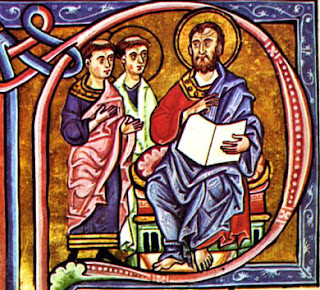Calendar Connections
Dear Brothers and Sisters,
About fourteen years ago, as my days of seminary preparation were drawing to a close, I turned my attention to finding my first job in the Church. Here in the Diocese of Newark at that time, there was one full-time position open: curate (assistant priest) at Grace Church in Madison.
I remember well the day I drove out to Madison for my interview with Grace’s then-rector, the Rev. Lauren Ackland. I was nervous and uncertain, not knowing what to expect. But after a few hours of talking with Lauren and several parishioners who would soon become dear friends, any concerns I had about fitting in at this vibrant suburban parish quickly evaporated. When it was almost time to go back home, dazzled by Grace's many ministries and its robust health, I asked Lauren, "Why do you think there is so much happening here?"
Looking back now, I'm a little embarrassed by that question. Just what did I expect Lauren to say? But, without giving it a moment's thought, she replied, "It's because of the weekday worship." I hoped my face didn't give away my surprise and even skepticism. Yes, sure, daily worship was the heartbeat of the seminary, designed in part to help train future "religious professionals." Could and would daily worship truly shape a parish's life? Surely there must be some other explanation!
During my years at Grace, I realized that Lauren was right (as usual). True, the vast majority of parishioners never attended a weekday service. Yet, there was a difficult to describe spiritual effect caused by worship occurring in that place every day of the year. Nearly always led by laypeople, these services bathed the church in prayer and helped to keep us connected to God between Sundays.
When I arrived here at St. Paul's, we quickly created a weekday worship schedule, nowhere near as ambitious as at Grace, but still life-giving for our hearty band of lay leaders and worshippers. And I believe that, just like at Grace, this prayer rhythm touched all of us, keeping us connected to God and each other. Our weekday worship has somehow shaped us as a community: a people meant to be Christians every day of the week, not just on Sunday.
I had always hoped that someday we would expand our worship schedule to every day of the year. That hasn't happened. But during the pandemic, we have unexpectedly and wonderfully become a community of weekday worshippers, dialing in and praying together three times each weekday.
Now we get to hear way more Scripture than we ever have. I know that some of us take the time to learn about the holy women and men commemorated on the church calendar. Maybe some of us reflect on how their lives and witness might inspire us to even greater faithfulness. Perhaps this sounds weird, but sometimes I find that even the church calendar itself - the schedule of feast days – helps me to connect the dots of the Christian life. For example, we began this week with a major feast, the Conversion of St. Paul. The Acts of the Apostles provides a vivid account of Paul's dramatic conversion on the road to Damascus, while the apostle himself is more circumspect about what was surely the most important event of his life. However it happened, God was able to convert Paul from an oppressor of the Church to the most zealous of apostles, a man who spent the rest of his life urgently and courageously sharing the Good News.
The next day we commemorated two of St. Paul's companions, Timothy and Titus, giving us an important reminder that even the most devoted and capable Christians need company; God intends us to work together. Finally, on Wednesday, we celebrated Lydia, Dorcas, and Phoebe. These three holy women receive just passing mentions in the New Testament yet still offer us powerful models of Christian discipleship.
I particularly love Lydia’s story. She was a Gentile, an apparently prosperous dealer of purple cloth. Perhaps because material wealth did not fully satisfy her, Lydia sought a relationship with Israel's God. One Sabbath, that search led to a riverbank where she encountered St. Paul. After God opened Lydia's heart to hear the apostle's message, she asked Paul to baptize her and her household right then and there. Tellingly, just after her Baptism, Lydia began her Christian life by extending hospitality to Paul and his companions, inviting them into her home.
This week the church calendar has connected so many dots of the Christian life. God calls us to conversion in ways that are usually subtle but sometimes quite dramatic. We are meant to be companions, to be people who break bread together, who share the joys and challenges of life. We are expected to proclaim the Good News to others, sometimes with words, but always through example and service. And, we are called to be hospitable, knowing that when we welcome others, especially people in need, we open the door to Jesus himself.






